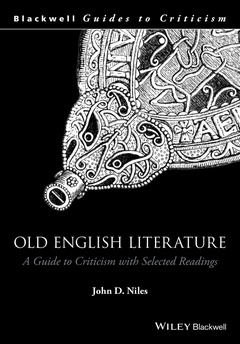Description
Old English Literature
A Guide to Criticism with Selected Readings
Blackwell Guides to Criticism Series
Author: Niles John D.
Language: English
Publication date: 05-2016
352 p. · 17x24.1 cm · Paperback
Publication date: 05-2016
352 p. · 17.8x24.6 cm · Hardback
Description
/li>Contents
/li>Biography
/li>
This review of the critical reception of Old English literature from 1900 to the present moves beyond a focus on individual literary texts so as to survey the different schools, methods, and assumptions that have shaped the discipline.
- Examines the notable works and authors from the period, including Beowulf, the Venerable Bede, heroic poems, and devotional literature
- Reinforces key perspectives with excerpts from ten critical studies
- Addresses questions of medieval literacy, textuality, and orality, as well as style, gender, genre, and theme
- Embraces the interdisciplinary nature of the field with reference to historical studies, religious studies, anthropology, art history, and more
Abbreviations xii
Part I Main Currents in Twentieth-Century Criticism 1
1 Old English Studies 1901–1975 3
The Earlier Twentieth-Century 4
Literary Criticism: A Slow Start 8
Two Scholars Representative of their Eras 10
New Directions after the Second World War 16
Changing Currents in Beowulf Studies 20
Key Works from the Early Seventies 32
Part II Anglo-Saxon Lore and Learning 41
2 Literacy and Latinity 43
Anglo-Latin Literature: Background or Mainstream? 44
Education in Two Languages 52
The Student in the Classroom 55
The Venerable Bede 58
A Selection from the Criticism 62
Excerpt: Joyce Hill, ‘Learning Latin in Anglo-Saxon England: Traditions, Texts and Techniques, (2003) 64
3 Textuality and Cultural Transformations 76
The Anglo-Saxon Book: Icon or Pragmatic Object? 78
Writerly Self-Reflexivity 81
Reading Old English Texts in their Manuscript Context 85
Authors and Scribes: The Flux of Texts 88
From Latin to Old English: Translation or Transformation? 92
Source Studies and the Culture of Translation 96
A Selection from the Criticism 100
Excerpt: M.B. Parkes, ‘The Palaeography of the Parker Manuscript of the Chronicle, Laws, and Sedulius, and Historiography at Winchester in the Late Ninth and Tenth Centuries’ (1976) 101
4 Orality 112
Parry, Lord, and their Legacy 116
Oral Poetics and Noetics 120
A Selection from the Criticism 126
Selection: Donald K. Fry, ‘The Memory of Cædmon’ (1981) 127
5 Heroic Tradition 136
Short Poems on Legendary Themes 139
Brunanburh, Maldon, and the Critics 142
Beowulf and the Critics 149
Indeterminacy and its Discontents 167
A Selection from the Criticism 171
Selection: Ernst Leisi, ‘Gold and Human Worth in Beowulf ’, first published as ‘Gold und Manneswert im Beowulf ’ (1952) 173
Part III Other Topics and Approaches 185
6 Style 187
A Selection from the Criticism 192
Selection: J.R. Hall, ‘Perspective and Wordplay in the Old English Rune Poem’ (1977) 194
7 Theme 203
A Selection from the Criticism 207
Selection: Hugh Magennis, ‘Images of Laughter in Old English Poetry, with Particular Reference to the Hleahtor Wera of The Seafarer’ (1992) 209
8 Genre and Gender 222
Genre 223
Gender 227
A Selection from the Criticism 230
Selection: Lisa M.C. Weston, ‘Women’s Medicine, Women’s Magic: The Old English Metrical Childbirth Charms’ (1995) 232
9 Saints’ Lives and Christian Devotion 246
A Selection from the Criticism 254
Selection: Edward B. Irving, Jr, ‘Crucifixion Witnessed, or Dramatic Interaction in The Dream of the Rood ’ (1986) 256
10 Ælfric 267
A Selection from the Criticism 274
Excerpt: Malcolm Godden, ‘Apocalypse and Invasion in Late Anglo-Saxon England’ (1994) 276
11 Translating, Editing, and Making it New 290
Translating 290
Editing 295
Making it New 297
A Selection from the Criticism 299
Selection: Joshua Byron Smith, ‘Borges and Old English’ 301
Afterword 319
Selection Bibliography 321
Index of Modern Authors Cited 329
General Index 336
John D. Niles is the Frederic G. Cassidy Professor of Humanities, Emeritus, at the University of Wisconsin, Madison, and Professor Emeritus of English at the University of California, Berkeley. A former President of the International Society of Anglo-Saxonists, he is the author or editor of a dozen books on Old English literature and related topics, including The Idea of Anglo-Saxon England 10661901: Remembering, Forgetting, Deciphering, and Renewing the Past (Wiley Blackwell, 2015) and Beowulf: The Poem and Its Tradition (1983).




